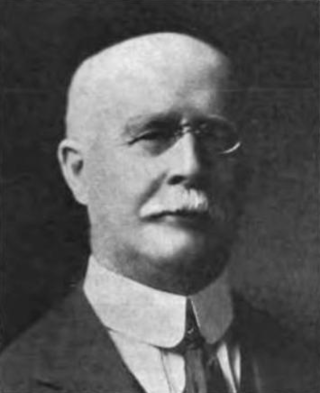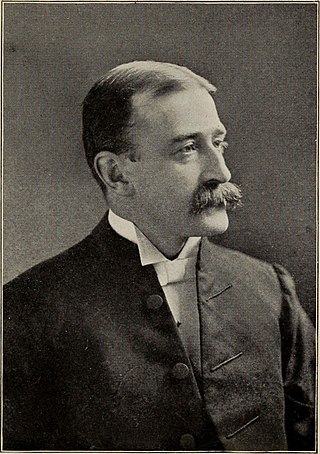Related Research Articles

Martin Joseph Wade was a United States representative from Iowa and a United States district judge of the United States District Court for the Southern District of Iowa.

Lawrence O'Brien Furlong was a merchant and political figure in Newfoundland. He represented St. John's East in the Newfoundland and Labrador House of Assembly from 1893 to 1904 and was speaker for the assembly from 1894 to 1897 and from 1901 to 1904.
Robert John Kent was an Irish-born lawyer and politician in Newfoundland. He represented St. John's East in the Newfoundland and Labrador House of Assembly from 1873 to 1886.
William J. S. Donnelly was an author and political figure in Newfoundland. He represented Placentia and St. Mary's in the Newfoundland and Labrador House of Assembly from 1878 to 1889, from 1893 to 1894 and from 1897 to 1899 as a Liberal, then Reform and later as a Conservative.
Maurice Fenelon was an Irish-born educator, merchant and political figure in Newfoundland. He represented St. John's West in the Newfoundland and Labrador House of Assembly from 1871 to 1878.
Patrick J. Scott was a lawyer and political figure in Newfoundland. He represented St. John's West in the Newfoundland and Labrador House of Assembly from 1872 to 1882, from 1885 to 1889 and from 1894 to 1897.
The 1885 Newfoundland general election was held on 31 October 1885 to elect members of the 15th General Assembly of Newfoundland in the Newfoundland Colony. The Reform Party had been created by Robert Thorburn on a platform of "Protestant Rights" after supporters of the Orange Order abandoned the Whiteway government after sectarian riots in 1885 against the government's 'denominational compromise'. Whiteway's Conservative Party was destroyed as a result and Whiteway founded a new Liberal Party. Thorburn's new party swept to power but soon turned away from its sectarian agenda by inviting Catholic Liberals into the Cabinet.
The 1893 Newfoundland general election was held on 6 November 1893 to elect members of the 17th General Assembly of Newfoundland in Newfoundland Colony. Although the Liberals won the majority of seats, the Tory party filed petitions against 15 elected Liberals and one Independent, James Murray, alleging election irregularities. The results of those elections were set aside by the courts and the candidates were barred from seeking reelection. The Tory Party, led by Augustus F. Goodridge, temporarily holding the balance of power, formed a government in 1894. Once the resulting by-elections had been held, the Liberals regained the balance of power and formed a government led by Daniel J. Greene. Greene's government passed legislation allowing candidates who had been disqualified to seek election again. William Whiteway was reelected in a by-election in early 1895 and became Premier.

James Francis McGrath was a fisherman and political figure in Newfoundland. He represented Placentia and St. Mary's in the Newfoundland and Labrador House of Assembly from 1885 to 1894 as a Liberal.

Sir Alfred Bishop Morine was a journalist, lawyer and political figure in Newfoundland. He represented Bonavista Bay in the Newfoundland and Labrador House of Assembly from 1886 to 1906 as a Conservative and from 1913 to 1916 as a member of the Fishermen's Protective Union.
The 1897 Newfoundland general election was held on 28 October 1897 to elect members of the 18th General Assembly of Newfoundland in Newfoundland Colony. The Tory Party led by James Spearman Winter formed the government. On February 15, 1900, the government was defeated following a vote on a motion of no confidence which was supported by the Liberals and several Tories.
James Joseph Louis (Jim) Greene was the Newfoundland and Labrador's Opposition Leader from 1960 to 1965 and leader of the Progressive Conservative Party of Newfoundland. He led the party through the 1962 provincial election in which the party increased its seat total in the Newfoundland House of Assembly from 3 to 7, more than doubling them, and its share of the popular vote from 25% to 36%. The result was not enough to prevent the Liberal government of Joey Smallwood from returning to power with a substantial majority government.

Sir William Henry Horwood was a politician and the Chief Justice of Newfoundland and Labrador from 1902 to 1944. He represented Trinity from 1894 to 1897 and from 1900 to 1902 and Harbour Grace from 1897 to 1900 in the Newfoundland House of Assembly.
Donald Morison was a lawyer, judge and politician in the Colony of Newfoundland. He represented Bonavista in the Newfoundland House of Assembly from 1888 to 1897 and from 1906 to 1913.
Henry Gear was a business and politician in Newfoundland. He represented Burin in the Newfoundland House of Assembly from 1894 to 1897 and from 1900 to 1913.
George Macness Johnson was a lawyer, judge and politician in Newfoundland. He represented Trinity in the Newfoundland House of Assembly from 1894 to 1897 and from 1900 to 1902.
Richard T. McGrath was a politician in Newfoundland. He represented Placentia and St. Mary's in the Newfoundland House of Assembly from 1894 to 1897 and from 1900 to 1904 as a Liberal.
Nicholas Joseph Vinnicombe was a merchant and politician in Newfoundland. He represented St. John's East in the Newfoundland House of Assembly from 1919 to 1925.
References
- 1 2 3 "Murphy, Thomas J. McCarthy". Encyclopedia of Newfoundland and Labrador. pp. 655–56.